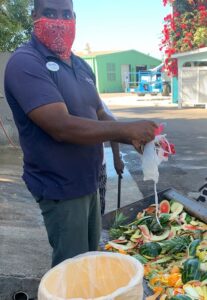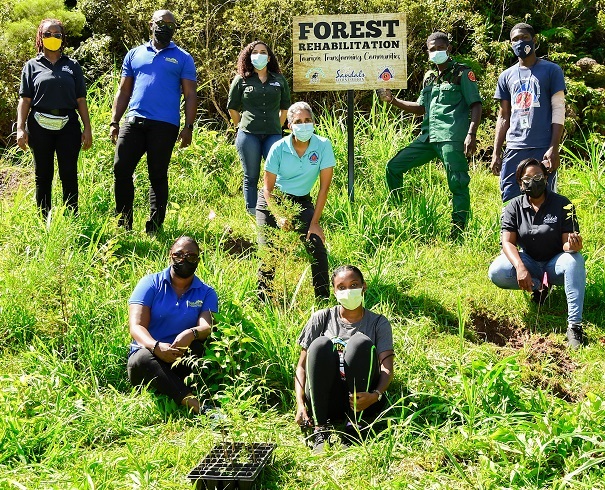#TheCarribean, April 22, 2022 — Gearing up to celebrate the fulfillment of its 10,000-tree planting commitment, the Sandals Foundation is expanding its conservation goal by adding another 10,000 trees to strengthen the Caribbean’s climate resilience and food security.
The massive conservation effort is in keeping with this year’s global Earth Day theme, ‘Invest in Our Planet’, and builds on the foundation’s larger Caribbean Tree Planting Project commitment, which is being coordinated by the Caribbean Philanthropic Alliance in collaboration with the Trees That Feed Foundation, the Clinton Global Initiative, and other partners.
Last April, the teams together announced plans to plant one million trees across 14 Caribbean countries by June this year. Now, with over 9,600 ornamental and food bearing trees already planted by the Sandals Foundation and its partners, the philanthropic arm of Sandals Resorts International is increasing the stakes.
“The environment around us is not only our home, but everything that keeps us alive,” said Heidi Clarke, executive director of Sandals Foundation. “Investing in the long-term viability of these natural environments will help to strengthen the many ecosystems that are critical for providing food, water, and protecting our communities and livelihoods, improving the way of life in the region for locals and tourists alike to enjoy.”
- Region specific activities
Outside of its tree planting mission, here in the Turks and Caicos Islands, the Sandals Foundation plans to establish community compost training in an effort to strengthen food security, increase solid waste management, and adopt climate smart agricultural practices. The island of Providenciales is known for having far less fertile soil with limited farmers or localized sources of produce. Now, through its Beaches Turks and Caicos resort, team members will lead the composting efforts, providing an opportunity for students and farmers from surrounding communities to learn, participate, and share the acquired knowledge and practices with their communities.
“Environmental education is an important part of our conservation efforts,” said Georgia Lumley, environmental coordinator at Sandals Foundation. “By collaborating with key organisations, students are learning about the importance of protecting the environment and endangered species while participating in activity execution through eco-camps and field trips.”
In Barbados, the Foundation’s conservation efforts will see to the enhancement and improving the eco-offering and experience at the historic Andromeda Botanic Gardens by adding an ethnobotanical garden with an outdoor classroom, creative signage, and the planting of 30 trees. Sandals Foundation, in collaboration with the park’s managers, Passiflora Limited, is creating a haven for native and regional plants, their cultural uses, the associated biodiversity, and a resource for the Barbadian community.
Last year, with support from the Sandals Foundation, the Grenada Fund for Conservation planted 4000 mangroves. Now, with the upcoming infrastructural improvements and training of community guides at Woburn Interpretive Centre, the initiatives will strengthen the island’s coastline and build on their efforts to encourage eco-tourism respectively.
In Jamaica, over 2000 timber trees have been planted as part of reforestation and conservation efforts at the biodiversity hotspot of the UNESCO World Heritage Site—the Blue and John Crow Mountains National Park. The area which contains 50 percent of the island’s endemic plants, is managed by the Jamaica Conservation and Development Trust, with whom the Foundation partners to activate its initiatives.
Team members from Sandals and Beaches Resorts have also rolled up their sleeves and, together with representatives from the Forestry Department and the Mustard Seed Community in Jamaica have planted almost 200 food-bearing trees in communities, with plans to plant 600 more by June.
The careful management of invasive species is also a key component in the philanthropic arm’s conservation effort.
In The Bahamas, Sandals Foundation ambassadors along with the Bahamas National Trust are set to remove invasive species and plant some 1000 trees in the Lucayan National Park. Through the engagement of student volunteers, the islands will continue its rich tradition of promoting environmental education among its young people, thereby fostering the next generation of environment stewards.
invasive species and plant some 1000 trees in the Lucayan National Park. Through the engagement of student volunteers, the islands will continue its rich tradition of promoting environmental education among its young people, thereby fostering the next generation of environment stewards.
“We are educating students and communities throughout the region on the importance of removing invasive species as we enter spaces they occupy and plant native species,” “We have supplemented these removals with reforestation activities that include the planting of food-bearing trees, such as what we continue to support at Signal Hill in Antigua,” said Lumley.
The construction of a shade house at Wallings Nature Reserve in the twin island territory will also contribute to the charitable arm’s conservation efforts, which began in that area last year with the planting of 1,008 food-bearing trees.
The Sandals Foundation has an extensive record of environmental conservation. Over the past 13 years, the organisation has planted over 17,000 fruit and ornamental trees throughout the Caribbean by galvanizing the support of Sandals and Beaches Resorts team members, community groups, partners, travel agents, guests, students, and volunteers.
This year, the entity remains committed to increasing forest coverage, protecting wildlife, enhancing biodiversity, creating eco-tours, educating children and empowering communities to take part in conservation.
Persons wishing to support the tree planting efforts can visit the Sandals Foundation website at www.sandalsfoundation.org and donate to the ‘Caribbean Tree Planting Project’. One hundred percent of all funds donated will be directed towards purchasing seedlings and maintaining the plant sites to ensure tree survival.
Press Release: Sandals Foundation


 News6 days ago
News6 days ago
 Caribbean News7 days ago
Caribbean News7 days ago
 News6 days ago
News6 days ago

























